Episodes
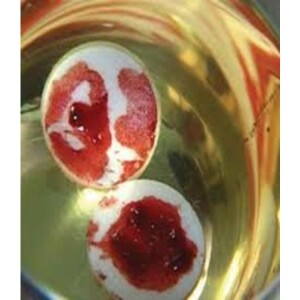
Wednesday Jun 12, 2024
Wednesday Jun 12, 2024
Eucharistic Miracle Sokolka Poland, 2008. On October 12, 2008, at the church dedicated to Saint Anthony of Sokółka, the Holy Mass of 8:30 AM is celebrated by a young vicar, Filip Zdrodowski. During Communion, unknowingly the Host falls from the hands of one of the priests.
A woman kneeling, ready to receive the Eucharist, makes him notice it. The priest remains paralyzed from fright and believing it was dirty, places it in the vasculum, a small silver vessel which contains the water utilized by priests to wash their fingers after distributing Communion.
At the end of the Holy Mass, the sacristan, Sister Julia Dubowska, takes the vasculum with the Host and for increased safety pours it into another vessel which she then locks in the safe where the chalices were kept.
A week later, on Sunday, October 19, around 8:00 AM, the sister opens the safe and finds the Host almost dissolved but with some strange red clots in the center. She immediately calls the priests to show them what was discovered. The Host was mostly dissolved. Only a very small piece of the consecrated bread was left, tightly interconnected to the substance that appeared on its surface.
Actually, part of the Host was joined to that “strange red clot”. The pastor of Sokółka then contacted the Metropolitan Curia of Białystok. Archbishop Edward Ozorowski together with the Chancellor of the Curia, priests and professors examined the Host and, astounded, decide to wait for the development of the events and to see what would happen next.
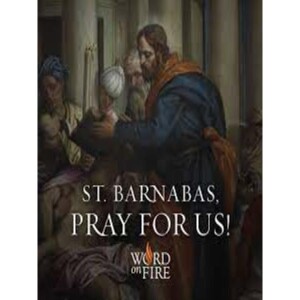
Tuesday Jun 11, 2024
Tuesday Jun 11, 2024
Stand In The Gap With Us And St. Barnabas, Traveler and Missionary 6/11/2024. The Catholic Faith over the past two thousand years have branched all over the world through that apostolic witness beginning with Jesus call for the Apostles to go to all the Nations. The New Testament tells how the Church first began our missions starting in Jerusalem and the Holy Land.
One of the earliest follows of Christ and his Apostles was a Jewish born citizen coming from Cyprus often called Joseph. He was a business man who had property and he gave monetary support to the Apostles. Acts 4:36-37 states, "Thus Joseph who was surnamed by the apostles Barnabas (which means, Son of encouragement), a Levite, a native of Cyprus, sold a field which belonged to him, and brought the money and laid it at the apostles' feet."
The Apostles gave Joseph a nick name calling him St. Barnabas because of the support he offered them. St. Barnabas offered much consolation exhorting the Apostles in their service to the community. St. Barnabas was a great asset and bridge between the Apostles and the new Believers who were being added to the young Catholic Church.
After the conversion of Saul who would become Paul, St. Barnabas influenced the concerned community to accept him into the Faith. Acts 9:26-27 states, "And when he had come to Jerusalem he attempted to join the disciples; and they were all afraid of him, for they did not believe that he was a disciple. But Barnabas took him, and brought him to the apostles, and declared to them how on the road he had seen the Lord, who spoke to him, and how at Damascus he had preached boldly in the name of Jesus." With Paul, St. Barnabas traveled to Antioch, Syria to establish churches throughout the region.

Monday Jun 10, 2024
Monday Jun 10, 2024
The ArchAngel Michael’s words before fighting Lucifer: The words of Archangel Michael, immediately prior to fighting Lucifer and his angels in Heaven (Rv 12:7-9), after Lucifer had declared that he would not serve God:
“Worthy is the Highest of honor, praise and reverence, and of being loved, feared and obeyed by all creation. He is mighty to work whatever He desires.
He that is increate and without dependence on any other being, cannot seek any thing that is not most just. To us He gave grace such as we have, creating us and forming us out of nothing. He can create other beings, as many and in what manner He pleases.
It is reasonable that we, submissive and prostrate in His presence, adore his Majesty and kingly grandeur.
Come then, ye angels, follow me, let us adore Him, and extol His admirable and secret judgments, His most perfect and holy works. God is most exalted and above all creatures, and He would not be the Most High, if we could attain or comprehend His great works.
Infinite He is in wisdom and goodness, rich in the treasures of His benefits. As Lord of all and needing none, He can distribute them to whomsoever He wishes, and He cannot err in the selection. He can love and confer His favor to whomsoever He chooses, and He can love whom He likes; He can raise up, create and enrich according as it is His good pleasure.
In all things He will be wise, holy and irresistible. Let us adore and thank Him for the wonderful work of the Incarnation which He has decreed, and for His favors to His people and for its restoration to grace after its fall. Let us adore this Person endowed with the human and the divine nature, let us reverence It and accept It as our Head; let us confess, that He is worthy of all glory, praise and magnificence, and, as the Author of grace, let us give Him glory and acknowledge His power and Divinity.”
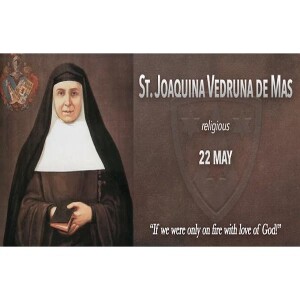
Monday Jun 10, 2024
Monday Jun 10, 2024
Stand In The Gap With Us And Saint Joachima 6/10/2024: Joaquima Vedruna Vidal de Mas was born on 16 April 1783 in Barcelona to the nobles Lorenzo de Vedruna - who worked for the government.
Born into an aristocratic family in Barcelona, Spain, Joachima was 12 when she expressed a desire to become a Carmelite nun. But her life took an altogether different turn at 16 with her marriage to a young lawyer, Theodore de Mas. Both deeply devout, they became secular Franciscans. During their 17 years of married life they raised eight children.
Her childhood was a pious one and she fostered a special devotion to the Infant Jesus while being known for her obsessive cleanliness and she made her First Communion in 1792
When Napoleon invaded Spain, Theodore served in the Spanish army, after he had moved his family to Vich. When the French troops arrived there, Joachima had to flee with her children; but after the war she returned to that city, the birthplace of her husband.
Joachima and Theodore were both members of the Third Order fraternity at the Capuchin church in Vich. She was only thirty-three when Theodore died in 1816 at the age of forty-two.
Though her old desire to enter a religious community was still strong in her, Saint Joachima de Vedruna had duties to perform towards her children; and so, for the first seven years of her widowhood she took care of her children.
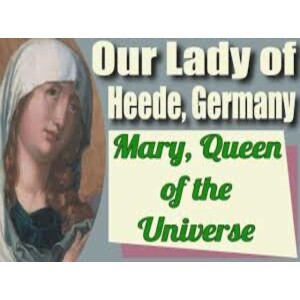
Monday Jun 10, 2024
Monday Jun 10, 2024
Join John Carpenter, Don Hartley, and the Deeper Truth research team as they investigate the events in Heede, Germany in 1937-1945. The reported apparitions of Heede, Germany took place between November 1, 1937 and November 3, 1940. There were four children seers involved whose names are known but little else.
Here are their names: Margaret Gansferth, Greta Gansferth, Anna Schulte, Susanna Bruns.
Mary appeared to the children near their homes, in a meadow, and at other places. She didn't use a special title, but was holding the Divine Child in her arms when she first appeared.
Mary appeared to the children an undetermined number of times of which only three were recorded. After the children were forbidden by the Gestapo (and briefly arrested) to go to the place of the original apparition, Mary appeared to them in secret. Prayer, conversion, and the rosary (which "has immeasurable power") are to be considered as primary messages.
It is reported that Our Lady herself became the teacher of the children. The Heede apparition appears to be a follow up on the Fatima event and promotes its message (it is deplored that mankind had ignored the Fatima messages).
Apparitions of other holy persons are reported (Jesus himself and the "angel of justice"). There is talk about secrets given to the seers separately but never revealed. The seers were reportedly told of a coming "minor judgment." It was only after wonderful cures occurred that the parish priests and other clergy supported the seers (e.g. forbidding a public dance announced for October 21, 1945).
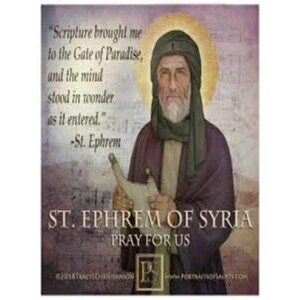
Sunday Jun 09, 2024
Sunday Jun 09, 2024
Stand In The Gap With Us And Saint Ephrem Doctor of the Church 6/9/2024. Ephrem is the patron saint for Spiritual Directors and Spiritual Leaders. Many of them call upon St. Ephrem today for his intercession in times of trouble and discernment.
Poet, teacher, orator, and defender of the faith, Ephrem is the only Syriac Christian recognized as a doctor of the Church. He took upon himself the special task of opposing the many false doctrines rampant at his time, always remaining a true and forceful defender of the Catholic Church.
Ephrem was born in the city of Nisibis in approximately 306. Traditions differ on the question of his family background, with some sources attesting that his father was at one time a pagan priest.
Born in Nisibis, Mesopotamia, he was baptized as a young man and became famous as a teacher in his native city. When the Christian emperor had to cede Nisibis to the Persians, Ephrem fled as a refugee to Edessa, along with many other Christians. He is credited with attracting great glory to the biblical school there. He was ordained a deacon but declined becoming a priest. Ephrem was said to have avoided presbyteral consecration by feigning madness!

Sunday Jun 09, 2024
Sunday Jun 09, 2024
Alcohol, Blessing Or Plague: The Catholic Church has been a target for some who oppose the total drinking of alcohol. Some of my Protestant friends primarily from the fundamentalist background really do not have the proper understanding in scripture, the culture, nor customs going back to the time of Jesus.
Most of these denominations were founded in the United States within the past 100 years. They are largely influenced with that rugged individualism of the American culture.
Unfortunately, many Americans are not known for our ability to drink without getting rowdy, raunchy, lewd, crude, and socially unacceptable.
It is also an established fact that alcohol is usually involved with domestic violence. Something like 90% of the time. Drinking can lead to the lowering of inhibitions and the result is more lewd and reckless behavior.
Drinking and driving is always a problem as thousands die each year on our highways. Many more are crippled for life, scared beyond recognition not only in body but also spirit.
Is there a "Christian" approach to drinking? I personally have never been drunk in my life and I thank God for His protection in my life. I've had people close to me who have been alcoholics, those who have struggled with this problem. President Donald Trump tells the story of his brother who had a drinking problem and as a result, he does not drink. That is always a good solution.
During the time of Jesus, in that part of the world in particular, the water was not healthy to drink. The people grew accustomed to the desert. Much of this land is desert even to this day.
I've been deployed in the Middle East from Saudi Arabia to Iraq to Kuwait. It is one large sandbox. Traveling by foot, or by camel was the way of life. Not a lot has changed there, but there are signs of civilization when you get to the cities.

Saturday Jun 08, 2024
Saturday Jun 08, 2024
Stand In The Gap With Us And Saint William of York 6/8/2024. A patron saint of victims of injustice. Saint William of York's early career in the church was very successful. As a young man in 1130, he was appointed treasurer of York and chaplain to King Steven. He was known as a kind and good-natured person. A disputed election as archbishop of York and a mysterious death. Those are the headlines from the tragic life of today’s saint.
Born into a powerful family in 12th-century England, William seemed destined for great things. His uncle was next in line for the English throne—though a nasty dynastic struggle complicated things. William himself faced an internal Church feud.
Despite these roadblocks, he was nominated as archbishop of York in 1140. Local clergymen were less enthusiastic, however, and the archbishop of Canterbury refused to consecrate William. Three years later a neighboring bishop performed the consecration, but it lacked the approval of Pope Innocent II, whose successors likewise withheld approval. William was deposed, and a new election was ordered.
It was not until 1154—14 years after he was first nominated—that William became archbishop of York. When he entered the city that spring after years of exile, he received an enthusiastic welcome. Within two months he was dead, probably from poisoning. His administrative assistant was a suspect, though no formal ruling was ever made.
Despite all that happened to him, William did not show resentment toward his opponents. Following his death, many miracles were attributed to him. He was canonized 73 years later.
He was honoured as a martyr because he was on a pilgrimage to holy places. As a result of the miracle involving the madwoman as well as other miracles wrought at his intercession after death, he was acclaimed a saint by the people.
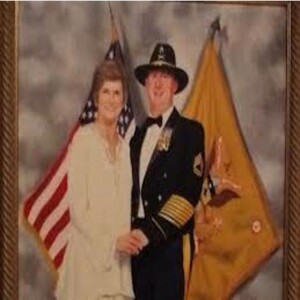
Saturday Jun 08, 2024
Saturday Jun 08, 2024
Virtues, The Seed for Evangelization: Evangelization is the call of all Christians who follow Christ in their daily walk. This is central to our call to follow Christ. This is done primarily in how we live out our lives. Through our passion to follow Christ, we must live our lives accordingly. We are known through three basic things. 1. We are known by what we say. Our words have impact. 2. We are known by what we do, does our actions speak our words. 3. We are known by the things we love. What is our passion.
If following Christ is our passion, then our lives will reflect what we say and do.
St. Peter writes, "Now who is going to harm you if you are enthusiastic for what is good? But even if you should suffer because of righteousness, blessed are you. Do not be afraid or terrified with fear of them, but sanctify Christ as Lord in your hearts. Always be ready to give an explanation to anyone who asks you for a reason for your hope, but do it with gentleness and reverence, keeping your conscience clear, so that, when you are maligned, those who defame your good conduct in Christ may themselves be put to shame. For it is better to suffer for doing good, if that be the will of God, than for doing evil" (1 Peter 3:13-17).
My Mother converted to the Catholic Faith through the example of a co-worker when I was very young. Mom was raised in an anti-Catholic household and she was raised with great bias against Catholics. She thought of Catholics as like a foreign country. Through the example of a Catholic friend who worked with her, my Mother became open to investigate the Catholic Faith. This would ultimately lead to my being Catholic. In thinking about this, in researching the virtue of our holy Faith, I consider the Catholic Catechism of the Church, (CCC) 1697:
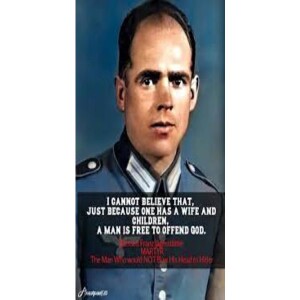
Friday Jun 07, 2024
Friday Jun 07, 2024
Stand In The Gap With Us And Blessed Franz Jägerstätter 6/7/2024. Franz Jägerstätter was born on 20 May 1907 in St Radegund, Upper Austria, to his unmarried mother, Rosalia Huber, and to Franz Bachmeier, who was killed during World War I. After the death of his natural father, Rosalia married Heinrich Jägerstätter, who adopted Franz and gave the boy his surname of Jägerstätter in 1917.
Called to fight for his country as a Nazi soldier, Franz eventually refused, and this husband and father of three daughters—Rosalie, Marie and Aloisia—was executed because of it.
Born in St. Radegund in Upper Austria, Franz lost his father during World War I and was adopted after Heinrich Jaegerstaetter married Rosalia Huber. As a young man, he loved to ride his motorcycle and was the natural leader of a gang whose members were arrested in 1934 for brawling. For three years he worked in the mines in another city and then returned to St. Radegund, where he became a farmer, married Franziska and lived his faith with quiet but intense conviction.
In 1938, he publicly opposed the German Anschluss–annexation–of Austria. The next year he was drafted into the Austrian army, trained for seven months and then received a deferment. In 1940, Franz was called up again but allowed to return home at the request of the town’s mayor. He was in active service between October 1940 and April 1941, but was again deferred. His pastor, other priests, and the bishop of Linz urged him not to refuse to serve if drafted.
